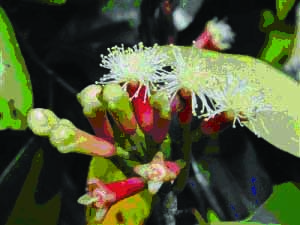NEW DELHI
- GST NO. : 07AAHPG9824B1ZW
View Mobile Number
Caryophyllus Aromaticus (Lavanga, Cloves)

Biological Name :
Caryophyllus aromaticus, Syzygium aromaticum, Eugenia caryophyllata
Family :
Myrtaceae
Other Names :
Caryophyllus, Clovos, Clove, Laung, Laving, Lavang Kalika, Kirambu, Mekhak, Karanfal.
Habitat :
The plant is indigenous to Burma and India, Philippines and Spice Islands, but is specially raised in Brazil, West Indies, Jamaica, Sumatra, India, and other tropical countries. It is cultivated mainly in Tamilnadu and Kerala. Clove belongs to evergreen plants; its stem can reach up to 30 feet in height. Its leaves are ovate-shaped and oppositely located, while its flowers are bell-formed, white and red-colored, if allowed to blossom. The clove used as a cooking spice is taken from flower bud. The fruit includes one or two seeds.
Additional Info :
It is Katu (pungent), laghu (light), tikta (bitter), seethveeryam (cold), beneficial for eyes; gastric stimulant, digestive, appetizing; efficacious in deranged kapha, pitta, dyscrasia, thirst, vomiting, flatulence; gives quick relief to colic; reliable remedy for cough, dyspnoea and hiccup.
Elements Applied :
Flower buds are commonly applied in herbal medicine.
Active Components :
Cloves owe their valuable properties to the presence of an essential oil containing eugenol and triterpine acids. Eugenol comprises from 60 to 90 percent of clove oil, which takes responsibility for the majority of herb's effects.
History :
- When Han dynasty was in power, people who spoke to the emperor should necessarily have held clove in the mouth to conceal unpleasant breath. Conventional Chinese medicine prescribes the plant for athlete's foot and other fungal conditions, ringworm, hernia, diarrhea, and indigestion.
- In Ayurvedic medicine the herb was believed to relieve digestive tract conditions and respiratory diseases.
- Clove's first application in Europe dates back to the fourth century. In the medieval age, clove was applied by German homoeopathists as part of gout treatment.
- When clove was finally distributed across Europe, it was employed as a remedy for diarrhea, vomiting, sickness, flatulence, and indigestion. Additionally, it was applied for toothache, wounds, worms, warts, infertility, and coughs.
- In the early times of America clove was employed in gastro-intestinal conditions, and mixed with bitter herbal medications to enhance their taste. It was early American herbalists who first produced clove oil using its buds. This oil was applied to the gums to reduce toothache.
- In modern herbal medicine clove is applied as a toothache relief, and as a remedy for gastro-intestinal conditions.
Used For :
- The herb is known to prevent vomiting, reduce pains, and act as an anti-septic. Several oil drops will help prevent vomiting, while tea can be used to prevent sickness.
- It is used in flatulence and dyspepsia due to its aromatic, carminative, antispasmodic and digestive properties. It also helps to tone up nervous system. It promotes digestion of fatty and crude food, promotes nutrition and relieves gastric and intestinal pains and spasms. It helps to improve functions of salivary glands, kidneys, liver and bronchial mucus membranes; infusion helps to allay thirst.
- It is useful in coughs and other respiratory disorders and acts as an expectorant. It improves the breath and is popular remedy for sore throat, headaches and coryza. In asthmatic patients it relives the bronchial spasm of alveoli.
- Clove is used to relieve toothache, sterilize root canals, also acting as a mouth cavity anesthetic.
- Clove oil is commonly included into a wide range of mouthwashes and non-prescription demulcent remedies for toothache, where it is listed as an active component. Clove oil reduces toothache flashes if used as a mouthwash.
- The herb is known to eliminate bowel helminthes and harmful microorganisms, reducing their number in the intestinal tract, for which reason it has been conventionally used for bowel helminthes, diarrhea, and other gastro-intestinal conditions.
- Along with other cooking spices, clove may be applied as a muscle relaxant to promote successful digestion.
- Used externally, the oil is rubefaceint.
Preparation and Intake :
- For an infusion, take a teaspoon of herb powder extract and fill it up with 250 ml of boiling water. Infuse for ten to twenty minutes. This should be consumed in a quantity of three cups per day.
- Medically prescribed clove dose is inapplicable for infants (under two years of age). For older infants and senile individuals who are more than 65 years of old, weak-strength medications and doses should be applied first, and then their amount should be increased if needed. To relieve toothache before you reach your dentist, swab the affected gum area and the tooth with clove oil.
Safety :
- 1-2.5 ratti (0.13-0.3 gm) per day can be taken safely (Bhavaprakasha Nighantu). Exercise care. Herbs in Ayurvedic medicine are commonly mixed with other herbal medicines to reduce the toxic effect one of them may produce on the body.
- Toothache should be relieved under professional medical supervision. Clove oil should only be used as an instant remedy, but for proper treatment visit your stomatologist.
- According to Japanese scientists, clove is rich in antioxidants, like the majority of kitchen spices. Antioxidants are responsible for keeping cells intact, which can prevent one from being exposed to cancer. However, according to scientific researches, synthetic eugenol is capable of provoking mild tumor development, thus contributing to clove’s pro-cancer activity, and making its effect on the body contradictory. For the present moment, there is still little evidence to prove whether clove is capable of preventing cancer to a larger extent than causing it. For this reason, people with history or predisposition to cancer, should avoid medical doses of clove.
- In other cases, individuals, who are not pregnant or breastfeeding, can safely apply clove in medical doses. Still, clove oil overdose may lead to stomach complaints. Occasionally, topical remedy application was reported to cause skin rashes.
Contact Us
Govind Madhav Herbal Tea
B-29-30, NEW DELHI - 110064, India
Call Us : View Mobile Number
Phone : +91-11-45615006
E-mail : govindmadhavtea@gmail.com

